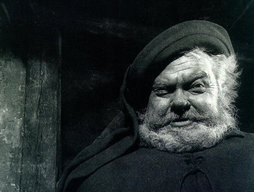In today’s Wall Street Journal “Sightings” column I reflect on the problem of perfectionism in the arts. Here’s an excerpt.
* * *
 Twenty-six years after his death, Orson Welles is back in the news. “Chimes at Midnight,” the 1965 film version of Shakespeare’s history plays that occupied him throughout his middle age, will be shown in England next month in what is being billed as a “brand-new, never-seen-before restoration.” The reason why it had to be restored is that “Chimes at Midnight” was made independently and on the cheap, for by 1965 Welles had so antagonized the Hollywood establishment that no major studio would have anything to do with him. As a result, “Chimes at Midnight” was shot, edited and dubbed under sub-standard conditions, and the prints that have circulated since the film’s original release are all of low quality.
Twenty-six years after his death, Orson Welles is back in the news. “Chimes at Midnight,” the 1965 film version of Shakespeare’s history plays that occupied him throughout his middle age, will be shown in England next month in what is being billed as a “brand-new, never-seen-before restoration.” The reason why it had to be restored is that “Chimes at Midnight” was made independently and on the cheap, for by 1965 Welles had so antagonized the Hollywood establishment that no major studio would have anything to do with him. As a result, “Chimes at Midnight” was shot, edited and dubbed under sub-standard conditions, and the prints that have circulated since the film’s original release are all of low quality.
Welles’ long-standing difficulties with Hollywood are the stuff of legend. At bottom, though, they amount to this: He was a fanatical, impractical perfectionist who was willing to spend any amount of time and money on his films. But it was always other people’s money, and the moguls who put up the money in Hollywood did so in order to make still more money. After Welles made “Citizen Kane” in 1941, it was clear that he was neither interested in making box-office smashes nor willing to tolerate the relentless assembly-line discipline of the American film industry. Hence he spent most of the rest of his life wandering in the wilderness of underfunded independent film production, unable to fully realize any of his creative dreams.
Is it fair to say that Welles’ perfectionism laid him low? Every great artist, after all, strives for perfection. In fact, that’s part of what makes them great: They’re never entirely satisfied with anything that they do….
Alas, that kind of suffering goes with the territory. The trick, as every artist knows, is not to let it interfere with getting things done. The wisest artists are the ones who finish a new work, walk away and move on to the next project. Whenever a colleague pointed out a “mistake” in one of Dmitri Shostakovich’s compositions, he invariably responded, “Oh, I’ll fix that in my next piece.”
The road to malignant perfectionism, by contrast, starts with chronic indecision. Jerome Robbins, whose inability to make up his mind was legendary throughout the world of dance, was known for choreographing multiple versions of a variation, then waiting until the last possible minute to decide which one to use. Beyond a certain point, this kind of perfectionism is all but impossible to distinguish from unprofessionalism, and Orson Welles reached that point early in his career….
* * *
Read the whole thing here.
Orson Welles talks about Chimes at Midnight and the character of Falstaff in a BBC interview:
Terry Teachout on the arts in New York City
An ArtsJournal Blog
